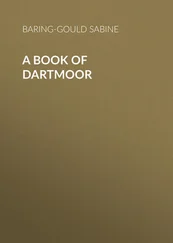Sabine Baring-Gould - A Book of the West. Volume I Devon
Здесь есть возможность читать онлайн «Sabine Baring-Gould - A Book of the West. Volume I Devon» — ознакомительный отрывок электронной книги совершенно бесплатно, а после прочтения отрывка купить полную версию. В некоторых случаях можно слушать аудио, скачать через торрент в формате fb2 и присутствует краткое содержание. Жанр: foreign_antique, foreign_prose, на английском языке. Описание произведения, (предисловие) а так же отзывы посетителей доступны на портале библиотеки ЛибКат.
- Название:A Book of the West. Volume I Devon
- Автор:
- Жанр:
- Год:неизвестен
- ISBN:нет данных
- Рейтинг книги:4 / 5. Голосов: 1
-
Избранное:Добавить в избранное
- Отзывы:
-
Ваша оценка:
- 80
- 1
- 2
- 3
- 4
- 5
A Book of the West. Volume I Devon: краткое содержание, описание и аннотация
Предлагаем к чтению аннотацию, описание, краткое содержание или предисловие (зависит от того, что написал сам автор книги «A Book of the West. Volume I Devon»). Если вы не нашли необходимую информацию о книге — напишите в комментариях, мы постараемся отыскать её.
A Book of the West. Volume I Devon — читать онлайн ознакомительный отрывок
Ниже представлен текст книги, разбитый по страницам. Система сохранения места последней прочитанной страницы, позволяет с удобством читать онлайн бесплатно книгу «A Book of the West. Volume I Devon», без необходимости каждый раз заново искать на чём Вы остановились. Поставьте закладку, и сможете в любой момент перейти на страницу, на которой закончили чтение.
Интервал:
Закладка:
Very probably the Dumnonii suffered their intrusion with reluctance, but they did not venture on forcible resistance, lest they should bring down on themselves the vengeance of Wessex.
When, however, the Saxons had established themselves in sufficient numbers, they had their headquarters in Exeter; but there they did not amalgamate with the natives. The Saxon town was quite apart from that occupied by the Britons, or West Welsh, as they called our Dumnonians. That part of Exeter which contains dedications to Celtic saints was the British town, as was also Heavitree, 8 8 Names of places, as Heavitree, Langtree, Plymtree, take the "tree" from the Welsh "tref," a farm or habitation. Heavitree is Tre-hafod, the summer farm.
with its daughter churches of S. Sidwell and S. David; but the Saxons occupied where now stands the Cathedral; and each settlement was governed by its own laws. It was not till 823 that Egbert, by a decisive battle at Gavulford ( Gafl a holdfast, and ffordd a road), established Saxon supremacy. He apparently drove the Devonshire Celts back along the Old Street, or Roman road, past Okehampton, till they made a stand at Coombow ( Cwm-bod = the habitation in a combe). There the hills close in on the road on both sides, and the way branched to Lydford. Commanding both roads is Galford Down; there the Britons threw up formidable entrenchments, or, what is more probable, occupied an earlier camp that remains intact to the present day. Here they made a desperate stand, and were defeated; after which the king, Egbert, cast up a burgh beyond the old dun , which gives its second name to the place, Burleigh, or Burgh-legh. The last relics of the independence of the Dumnonian kingdom disappeared after Athelstan's visit in 926 and 928. A relic of this visit may be seen in Rougemont Castle, Exeter, where the Anglo-Saxon work – notably some herring-bone masonry, and windows rudely fashioned without arches – remains.
A Saxon school had been established in Exeter before A.D. 700, to which S. Boniface, or Wynfrith as he was then called, had been sent. He was a native of Crediton, then a Saxon stockaded settlement, and over the palisades, as a boy, he had looked with scorn and hatred at the native Britons occupying the country. When he was in Exeter he, in like manner, regarded the native Christians with loathing as heretics, because they did not observe Easter on the same day as himself, and perhaps with accentuated hate, because he knew that they had possessed Christian teachers and Christian privileges three centuries before his own people had received the Gospel. Perhaps also his German mind was offended at the freshness, vivacity, and maybe as well the fickleness of purpose of the native Celt. This early acquired aversion lasted through life, and when he went into Germany and settled at Mainz, to posture as an apostle, he was vexed to discover that Celtic missionaries had preceded him and had worked successfully among his Teutonic forefathers in their old homes. Thenceforth he attacked, insulted, and denounced them with implacable animosity, and did his utmost to upset their missions and supplannt them with his own. Virgilius, an Irishman, with a fellow Paddy, Sidonius, was at Salzburg, and Virgilius was bishop there. Boniface beat about for an excuse to get rid of them both. He found that the bishop, having discovered that one of his priests had been accustomed to baptise using a bad Latin formula, had acknowledged this man's baptisms as valid, for the will was present: the fault was due to ignorance of the Latin tongue. Boniface, hearing of this, laid hold of it with enthusiasm, and denounced Virgilius at Rome. Pope Boniface, however, took the side of the Irishman against his over-zealous henchman.
Mortified at this rebuff, Boniface lay in wait to find another excuse for ruining Virgilius. He ascertained presently that the Irishman taught that the earth was round, and that there was an antipodes to those living in Germany. Now the Irish schools were the most learned in Europe, and Irish saints had sailed far into the west over the Atlantic: they had formed their own opinions concerning the shape of the world. Boniface wrote to the Pope to denounce the doctrine of Virgilius as "perverse and unjust, uttered against God and his own soul."
This doctrine Pope Zacharias hastened to condemn as heretical. 9 9 In my Lives of the Saints , written in 1874, I accepted M. Barthélemy's view, that Virgilius held that there were underground folk, gnomes; but I do not hold this now, knowing more than I then did of the learning of the great Irish scholars, and of the voyages made by the Irish. The earliest gloss on the Senchus Mor says, "God formed the firmament around the earth; and the earth, in the form of a perfectly round ball, was fixed in the midst of the firmament." – I. p. 27.
Virgilius had to go to Rome to justify his opinion before ignorant Latin ecclesiastics – with what results we do not know.
Athelstan came to Exeter in 926, and drove out the British inhabitants. He built towers and repaired the old Roman walls; he it was who founded the monastery of SS. Mary and Peter, afterwards to become the Cathedral; and, we are told, he gave to it relics of S. Sidwell. This was a local saint, of whom very little is known, save that she was the sister of Paul, who became abbot and bishop of Léon, in Brittany. She had two sisters, Wulvella and Jutwara, called also Jutwell and Eadware. Though the names seem Saxon, they are corruptions of Celtic originals. Wulvella became an abbess at Gulval, near Penzance, where she entertained her brother as he was on his way to Armorica. Sidwell is supposed to have been a martyr, possibly to Saxon brutality, but this is very uncertain, as her story has not been preserved. She has as her symbols a scythe and a well – "canting" symbols framed from her name. Her brother Paul founded a church that still retains his name, in the British portion of Exeter.
The bishop's seat had been at Crediton: the Saxon bishops did not like it. There were no walls there, and the Danes made piratical excursions. So Bishop Leofric induced Edward the Confessor to move the seat to Exeter, and this was done by Edward in person, in 1050.
In Fore Street is an odd misshapen little church, S. Olave's. This was endowed by Gytha, sister of Sweyn, the Danish king, and wife of Earl Godwin. She was the mother of Harold. She is said to have endowed it (1053) that prayer might be offered for the soul of her husband, and in honour of Olaf, King of Norway, who had fallen in battle in 1030. As S. Olaf fought against the Danes, and it was through the machinations of Canute that he came to his end, it is hard to see how a Danish lady should have felt any enthusiasm about Olaf, who was regarded as a saint and martyr by the national Norwegian party, which was bitterly opposed to the Danish. I suspect that the church already existed, and was dedicated to S. Gwynllyw of Gwent, who at Newport was also converted into Olave, by the English-speaking colonists. Both Gwynllyw and Olaf were kings, and it is noticeable that S. Olave's Church is in the British portion of Exeter. When William the Conqueror arrived before the city, Gytha, who was within the walls, escaped and took refuge in Flanders. William gave the church, with her endowments, to Battle Abbey. But I am not writing a history of Exeter. For those who desire to learn its story in full, I must refer them to the work of Mr. Freeman.
The Cathedral is disappointing, and that because it is built, not of the warm, red sandstone that abounds in the neighbourhood, and is very good building material, but of Beer stone, which is cold and grey. It has another defect: it is too low; but this was determined by the towers. When it was resolved to rebuild the Cathedral, it was decided to preserve the Norman towers, employing them as transepts. This settled the business. The church could not be made lofty; and on entering the western doors the visitor is at once disappointed. He feels a lack of breathing-space; the vaulting depresses him. The architectural details are not to be surpassed, but the whole effect is marred by the one mistake made at the outstart. One cannot wish that the towers had been removed, but one does regret that they were allowed to determine the height of nave and choir. The choir was begun by Bishop Quivil, in 1284, when also the great and incomparably beautiful windows were inserted in the towers. The nave was finished by Bishop Grandisson, in 1369, the year of his death.
Читать дальшеИнтервал:
Закладка:
Похожие книги на «A Book of the West. Volume I Devon»
Представляем Вашему вниманию похожие книги на «A Book of the West. Volume I Devon» списком для выбора. Мы отобрали схожую по названию и смыслу литературу в надежде предоставить читателям больше вариантов отыскать новые, интересные, ещё непрочитанные произведения.
Обсуждение, отзывы о книге «A Book of the West. Volume I Devon» и просто собственные мнения читателей. Оставьте ваши комментарии, напишите, что Вы думаете о произведении, его смысле или главных героях. Укажите что конкретно понравилось, а что нет, и почему Вы так считаете.












